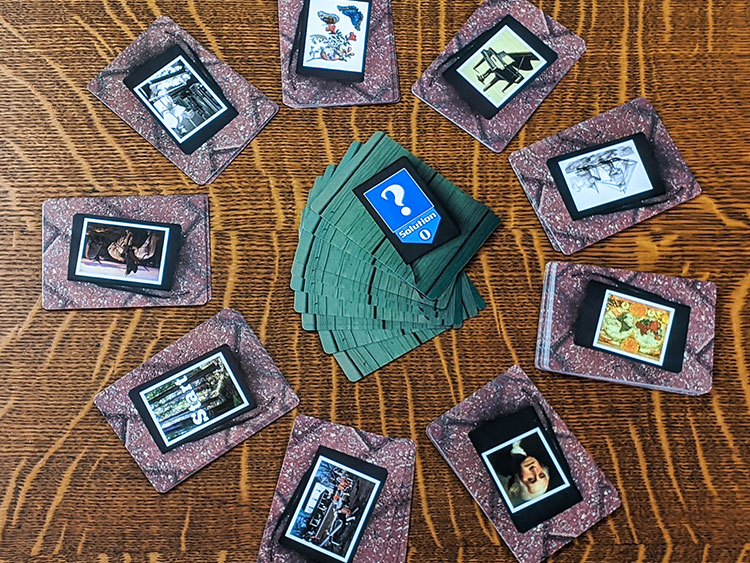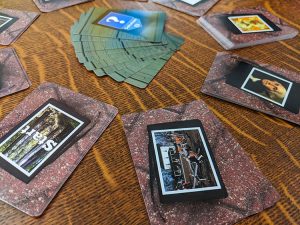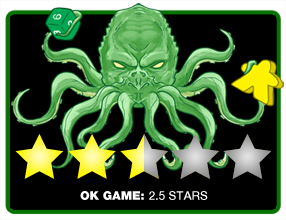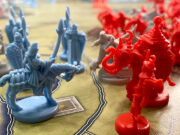 Doctor Esker has vanished—again! Or still, maybe? Look, it’s unclear. The flavor text is unchanged from the original game. Once again, players are presented with the only clues to his disappearance—a book of puzzles written in his own hand—the scribblings of someone who we are increasingly sure is a madman. Can you crack the new codes and find the doctor before time runs out?
Doctor Esker has vanished—again! Or still, maybe? Look, it’s unclear. The flavor text is unchanged from the original game. Once again, players are presented with the only clues to his disappearance—a book of puzzles written in his own hand—the scribblings of someone who we are increasingly sure is a madman. Can you crack the new codes and find the doctor before time runs out?
Son Of Doctor Esker’s Notebook is a puzzle game for 1-6 players that takes about 1-2 hours to complete.
Gameplay Overview:
In case you never played the original Doctor Esker’s Notebook, Son of Esker provides a new deck, this time of 74 cards that contain ten puzzles to solve. Each puzzle is composed of a set of cards that you will only examine one set at a time—there is no interconnectivity between puzzles at all. Puzzles range from a single card up to 14 cards.
Everything else is unchanged—solve puzzles by reading, rearranging, matching, deciphering, or doing a little lateral thinking. Stuck? Head to the website for a clue or two which are broken into chunks so you can still enjoy the thrill of completing the solve. The solution will reveal a sequence of numbers from two to five digits—when you think you’ve got it, gather the solution cards corresponding to the number sequence and flip them. If you see a cohesive message or image across all your solution cards, you’ve solved the puzzle and can advance to the next. Continue through all ten for the solution to Doctor Esker’s disappearance!

Game Experience:
Did you like the last Doctor Esker game? You’ll like this one the same amount. Did you not like the last game? This one won’t bring you around. Did you miss the last game entirely? This is a fine jumping off point as any, because no foreknowledge is required, nor do any continuous story threads exist. It’s all the same style of code breaking and lateral thinking types of puzzles, and in fact, I wouldn’t even say this one is really any harder or easier. So if you enjoy yourself, go back and try the first one. If you get this one first as a gift, don’t think you need to play the original first. This isn’t exactly Pandemic Legacy Season Two.
Unlike the EXIT games, there’s no waste here. Nothing gets damaged or cut up or destroyed so you can easily pass the deck off to new players when you’re done.

Additionally, the solution card mechanic is still a pretty clever system. It’s very easy to tell if you’re right or wrong, but you won’t be able to remember what you see to brute force the answers to tricky puzzles, or just draw a boring “Wrong Answer” card. The spread is still generally pretty small, though it does vary from puzzle to puzzle. Sometimes you need to rearrange card’s physical locations, so it’s not like you could hold all the cards in your hand to play. Set up and tear down are a snap, and if you can remember which puzzle you’re on, it’s much easier to take a mid-game break here than other escape room style games.
Also, the hint system online is still scalable to the help you need, as well as fairly generous and helpful without just telling you the answers.

That’s a lot of positive things, but there are some less positive aspects that really hold the Esker’s series back from true tabletop escape room greatness. I’ll be honest, we do a lot of these puzzle games and escape rooms. It’s not that the puzzles here aren’t fair, it’s just that sometimes they’re not worth the time investment to get to the right answer. Compare this to games like Unlock or Deckscape, where you’re constantly solving little puzzles here and there, progressing at a fairly consistent clip, and having something else to think about if you get stuck most of the time.
But in Esker, you might toil over a pile of 14 cards for a while just to end on a “hmm, clever”. As a rule, it just doesn’t feel as rewarding as other comparable games. And since you only get one puzzle at a time, there’s nowhere else to devote your brainpower if something isn’t clicking. Not good at code-breaking? Guess you’re sitting out this puzzle—hopefully, someone in your group is a crypto-genius.
Speaking of groups, the game advertises itself as a 1-6 player game. I can’t imagine playing this game with more than three though. Given that each puzzle is usually only employing a single person’s strengths at a time, too many cooks for a game like this sounds like a lot of downtime for a cooperative activity. And since one puzzle is only on a single card, and since most puzzles you need all the cards, this isn’t like some other escape room games where there may be something to gain by someone taking a super close look at one or two of the cards—the current person solving the puzzle needs all the pieces.
Final Thought:
In the end, it’s not like I hated this game or anything. It’s a fine puzzle game, genuinely clever in a lot of important ways. For some people, especially solo or duo puzzle aficionados, it’s a solid game all around. But I didn’t love the first one, so opening the box to see that, oh, it’s just literally exactly more of the same was very disappointing. Other escape room games feel cohesive even when they’re wildly divergent thematically, but like each entry is distinct and has its own flourishes. With Son of Eskar, if they packaged both games as one, you literally wouldn’t be able to tell them apart. The same puzzles, the same art style, the same story. I’m not even sure the apple has fallen out of the tree.
Final Score: 2.5 Stars – Same as original Doctor Esker, this will delight fans of that game but brings nothing new for those that found the first merely ok.
 Hits:
Hits:
• No Waste
• Some clever puzzles
Misses:
• Not great for groups over 2-3
• No changes since the first game
• Could use some fun art





















